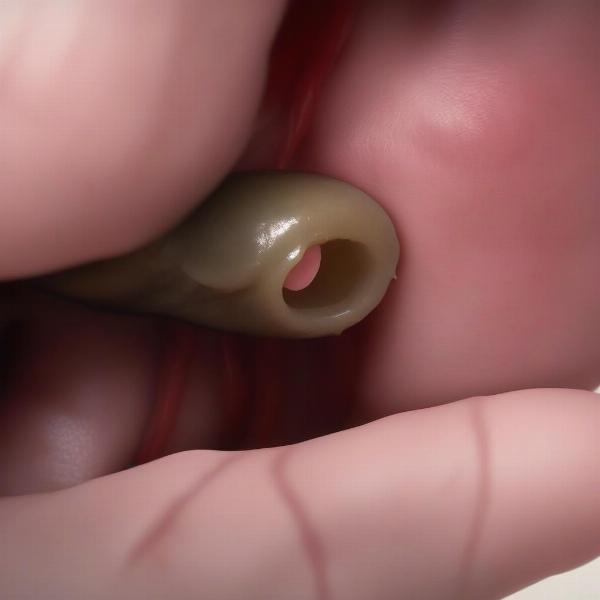Leeches and dogs might seem like an unlikely pairing, but understanding their potential interaction is crucial for responsible pet ownership. This guide delves into the risks, prevention, and treatment of leech infestations in dogs, equipping you with the knowledge to protect your furry friend.
Understanding the Risks of Leeches on Dogs
 Con đỉa bám vào tai chó
Con đỉa bám vào tai chó
While not all leeches are harmful, some species can transmit diseases or cause significant blood loss, especially in smaller dogs. Outdoor activities, particularly near freshwater sources, increase the risk of exposure. It’s essential to be vigilant and check your dog thoroughly after adventures in areas known to harbor leeches.
Preventing Leech Infestations
Preventing leech infestations is always preferable to dealing with the aftermath. Several practical measures can significantly reduce the risk:
- Avoid leech-infested areas: If possible, steer clear of known leech habitats, especially during peak leech season.
- Use dog-safe insect repellent: Consult your veterinarian for recommendations on repellents that effectively deter leeches without harming your dog.
- Protective clothing: Consider using dog boots or protective clothing when venturing into areas with potential leech presence.
- Regular checks: After outdoor activities, thoroughly examine your dog’s coat, paying particular attention to areas like the ears, paws, belly, and groin.
Removing a Leech from Your Dog
If you find a leech on your dog, do not panic. Pulling it off directly can cause the leech to regurgitate its stomach contents into the wound, potentially increasing the risk of infection. Instead, follow these steps:
- Locate the leech’s head: The smaller, narrower end is the head, which is attached to your dog’s skin.
- Use a flat object: Slide a credit card, fingernail, or similar flat object under the leech’s sucker to detach it.
- Clean the wound: Once the leech is removed, clean the wound with antiseptic solution and monitor for any signs of infection.
When to Seek Veterinary Care
While most leech bites are not serious, certain situations warrant veterinary attention:
- Excessive bleeding: If the bite site continues to bleed profusely after removing the leech.
- Signs of infection: Look for redness, swelling, pus, or increased pain around the bite area.
- Multiple leech bites: If your dog has been bitten by numerous leeches.
- Lethargy or other unusual symptoms: If your dog exhibits any signs of illness after a leech bite.
Are all leeches harmful to dogs?
No, not all leeches are harmful to dogs. While some species can transmit diseases or cause significant blood loss, many are harmless and will simply detach after feeding. However, it’s crucial to remove them safely and monitor the bite site for any signs of infection.
How can I protect my dog from leeches in my backyard?
Maintaining a well-maintained lawn and eliminating standing water can help reduce leech populations in your backyard. You can also consider using dog-safe insecticides recommended by your veterinarian.
Conclusion
Understanding the risks associated with leeches and implementing preventative measures are key to protecting your dog. By staying informed and prepared, you can ensure your furry companion enjoys their outdoor adventures without the unwanted company of leeches. Regular checks and prompt action in case of a leech bite are essential for minimizing potential complications.
FAQ:
- Are leeches dangerous to dogs? Some leech species can transmit diseases or cause significant blood loss.
- How do I remove a leech from my dog? Use a flat object to slide under the leech’s sucker and detach it. Do not pull it off directly.
- When should I take my dog to the vet after a leech bite? Seek veterinary care for excessive bleeding, signs of infection, multiple bites, or unusual symptoms.
- How can I prevent leech infestations on my dog? Avoid leech-infested areas, use dog-safe insect repellent, and conduct regular checks after outdoor activities.
- What should I do after removing a leech from my dog? Clean the wound with antiseptic solution and monitor for signs of infection.
- Can leeches transmit diseases to dogs? Yes, some leech species can transmit diseases to dogs.
- Are there dog-safe leech repellents? Consult your veterinarian for recommendations on dog-safe leech repellents.
ILM Dog is your trusted resource for all things canine. We offer expert advice on dog breeds, health, training, nutrition, grooming, and much more. From puppy care to senior dog support, we’re here to help you navigate every stage of your dog’s life. For more helpful tips and information, visit our website at ILM Dog or contact us via email at [email protected] or phone at +44 20-3965-8624.